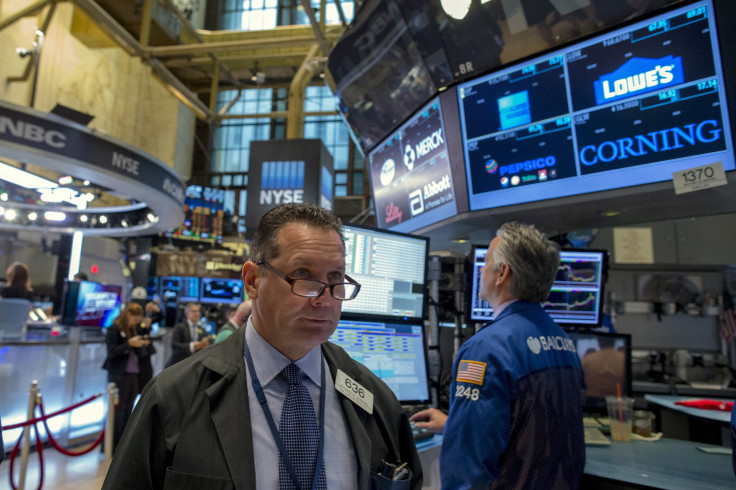Wednesday's Stock Market Open: US Equities Plunge As Market Rollercoaster Speeds Along, Oil Drops

KEY POINTS
- Bank of England cut rates to lowest level ever.
- ECB President Lagarde's warnings on coronavirus suggest her bank will also cut rates Thursday
- U.S. consumer inflation remained mild in February
Update: 2:25 p.m. EDT:
U.S. stocks continued to sell off as the Dow and S&P 500 near a bear market correction from all-time closing highs last month.
The World Health Organization declared the coronavirus outbreak a global pandemic
The Dow Jones Industrial Average dropped 1,382.25 points to 23,635.91 while the S&P 500 fell 145.46 points to 2,736.77 and the Nasdaq Composite Index tumbled 408.08 points to 7,936.17.
“We can see the panic in the equity market,” said Jerry Braakman, chief investment officer of First American Trust. “The big question for most people is, are we at the bottom yet? I think we’re only about halfway there.”
Update: 12:05 p.m. EDT:
The sell-off on Wall Street deepened at noon on Wednesday.
The Dow Jones Industrial Average dropped 1,038.44 points to 23,979.72 while the S&P 500 fell 106.77 points to 2,775.46 and the Nasdaq Composite Index tumbled 289.84 points to 8,054.41.
In Europe markets finished lower as Britain’s FTSE-100 fell 1.38%, France’s CAC-40 gained 0.35% and Germany’s DAX dropped 0.38%.
Crude oil futures traded at $33.37 per barrel.
“Markets seem disappointed that the White House did not release details of its fiscal response to the coronavirus,” said Brian Gardner, a Washington policy analyst at KBW. “We are still in early days and policymakers are continuing to grapple with different options and negotiate between the two parties and between Congress and the administration.”
Update: 10:50 a.m. EDT:
U.S. stocks suffered heavier losses in late morning trading on Wednesday.
The Dow Jones Industrial Average dropped 885.71 points to 24,132.45 while the S&P 500 fell 91.87 points to 2,790.36 and the Nasdaq Composite Index tumbled 240.51 points to 8,103.74.
Crude oil futures traded at $33.36 per barrel.
Original story:
U.S. stocks plunged on Wednesday as investors doubted the timing and efficacy of possible fiscal stimulus package to limit the financial impact of the coronavirus outbreak.
The Dow Jones Industrial Average dropped 720.26 points to 24,297.90 while the S&P 500 fell 74.36 points to 2,807.87 and the Nasdaq Composite Index tumbled 208.45 points to 8,135.80.
On Tuesday President Donald Trump reportedly suggested an elimination of the payroll tax rate through the end of the year when meeting with Senate Republicans as a way to alleviate the financial impact of the coronavirus. However, it’s unclear when or if such policies will be implemented.
“We need to see meaningful support for economic activity and credit backstops especially for small businesses, not a targeted approach executed only by the executive branch,” said Joe Kalish, chief global macro strategist at Ned Davis Research, said in a note. “We will likely need congressional involvement. This is a potential solvency problem.”
Johns Hopkins University reported that the number of coronavirus cases in the U.S. has surpassed 1,000. Italy has now 10,149 confirmed cases of the virus with 631 deaths.
On Wednesday, the Bank of England cut its benchmark rate by 50 basis points to 0.25% -- the lowest level in history -- one week after the Federal Reserve reduced its benchmark rate.
But Bank of England Governor Mark Carney said the coronavirus is “a different form of shock than 2008.” “There is no reason for this shock to turn into the experience of 2008, if we handled it well,” Carney said.
European Central Bank President Christine Lagarde warned that coronavirus could lead to an economic shock like the 2008 financial crisis unless European leaders act quickly – suggesting ECB may also cut rates on Thursday.
In the U.S., the Labor Department said Wednesday that the consumer price index edged up 0.1% in February, equalling its January increase.
“Despite the hopes for fiscal stimulus everywhere, we see significant downside risks,” said Guillaume Tresca, a strategist at Credit Agricole SA in Paris. “As long as uncertainties remain on the number of cases, and central banks’ actions and fiscal stimulus plans are not lifted, we see few reasons for a protracted and long-term rebound.”
Willie Delwiche, investment strategist at Baird, said: “Stocks posted impressive headline gains [on Tuesday], but more strength needs to be seen beneath the surface to have confidence that the downside momentum in stocks has been broken. The weight of the evidence continues to argue for caution in the near term and we recommend that investors remain patient in the face of ongoing market volatility.”
Overnight in Asia, markets closed lower. China’s Shanghai Composite tumbled 0.94%, while Hong Kong’s Hang Seng fell 0.63%, and Japan’s Nikkei-225 dropped 2.27%.
In Europe markets traded mixed as Britain’s FTSE-100 edged down 0.24%, France’s CAC-40 gained 0.35% and Germany’s DAX fell 0.14%.
Crude oil futures plunged 3.38% at $33.20 per barrel, Brent crude dropped 3.28% at $37.75. Gold futures rose 0.15%.
The euro rose 0.59% at $1.1348 while the pound sterling gained 0.38% at $1.2952
© Copyright IBTimes 2024. All rights reserved.





















